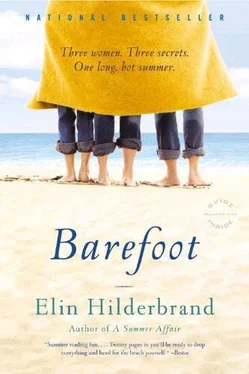Elin Hilderbrand - Barefoot - A Novel
Здесь есть возможность читать онлайн «Elin Hilderbrand - Barefoot - A Novel» весь текст электронной книги совершенно бесплатно (целиком полную версию без сокращений). В некоторых случаях можно слушать аудио, скачать через торрент в формате fb2 и присутствует краткое содержание. Жанр: Старинная литература, на английском языке. Описание произведения, (предисловие) а так же отзывы посетителей доступны на портале библиотеки ЛибКат.
- Название:Barefoot: A Novel
- Автор:
- Жанр:
- Год:неизвестен
- ISBN:нет данных
- Рейтинг книги:4 / 5. Голосов: 1
-
Избранное:Добавить в избранное
- Отзывы:
-
Ваша оценка:
- 80
- 1
- 2
- 3
- 4
- 5
Barefoot: A Novel: краткое содержание, описание и аннотация
Предлагаем к чтению аннотацию, описание, краткое содержание или предисловие (зависит от того, что написал сам автор книги «Barefoot: A Novel»). Если вы не нашли необходимую информацию о книге — напишите в комментариях, мы постараемся отыскать её.
Barefoot: A Novel — читать онлайн бесплатно полную книгу (весь текст) целиком
Ниже представлен текст книги, разбитый по страницам. Система сохранения места последней прочитанной страницы, позволяет с удобством читать онлайн бесплатно книгу «Barefoot: A Novel», без необходимости каждый раз заново искать на чём Вы остановились. Поставьте закладку, и сможете в любой момент перейти на страницу, на которой закончили чтение.
Интервал:
Закладка:
“Your daughter gave it to me,” Brenda said.
“Dandy,” he said. “Dan-dee.”
“You said she liked the book, right?” Brenda said.
He paused. “What’s the name of the goddamned book?”
“ The Innocent Impostor. ”
“There’s your first problem right there. You have to change the title. No one wants to see a movie about an innocent anything.”
“Change the title? ” Brenda said.
There was more yammering in the background. “Okay, right, yes. I stand corrected. My wife makes a point about The Age of Innocence . Edith Wharton, Martin Scorsese, nominated for an Oscar. Fine, okay, fine. Go ahead.”
“Go ahead, what?”
“Pitch it. I’l give you thirty seconds. Go!”
“Uh, wel ,” Brenda said, thinking, Speak! She knew the book inside and out; it was her passion, her baby. “It’s a period piece, seventeen hundreds, this man, Calvin Dare, our protagonist, is tying up his horse in front of a tavern and there’s lightning and his horse startles and kicks this other man, Thomas Beech, in the head and kil s him.”
“I’m practical y asleep.”
“So then the first man, Calvin Dare, goes through this process where he becomes Thomas Beech. He takes Beech’s job, he marries Beech’s fiancée, he lives Beech’s life for him, basical y, and sheds his own identity so that he can become Beech. Because Beech’s life was better than his, maybe. Or . . . because he feels guilty about kil ing Beech.”
“That’s it?” Ron Feldman said.
“Wel , no, but you’d have to read . . .”
“Thank you for cal ing, Dr. Lyndon.”
“Can I send you . . .”
“Here’s an idea: Write a screenplay about a professor who has sex with one of her students and then destroys mil ions of dol ars of university-owned art. We’re talking about smal release for sure, but that, at least, has half a story line. The other thing, no.”
“No?”
“Good night, Dr. Lyndon.”
“Oh,” Brenda said. In the other cottage, the light went off. The woman disappeared from view. “Good night.”
Josh was going to quit.
There was only a week and a half of babysitting left anyway, and now that Ted was around, Vicki had cut back Josh’s hours nearly every day.
Bring the kids home early. We’re going to take them out to lunch. Drop them off at the casino. Ted is playing tennis. Josh heard talk about another evening picnic out at Smith’s Point but he had yet to be invited, and if they did invite him, he would say no. And yet, the fact that they didn’t invite him bothered him. Was Josh no longer “part of the family”? Were they through with him? Was he expendable? Wel , yeah, he’d have to be an idiot not to sense things coming to a close. After al , Vicki’s chemo was over, it had been successful, she was gearing up for her surgery, which would be in Connecticut. Brenda had finished her screenplay and was now consumed with printing it, nestling it into cardboard boxes, and sending it out, cold, to studios. And Ted was here for his vacation. So there was no reason to include Josh on the family outing; they probably thought it wise to cut Josh loose from the kids now, otherwise the separation would be too hard on them. That was al fine and wel , and yet Josh was hurt. He had been more a part of this family than anyone knew, because of Melanie. And yet, it was because of Melanie that Josh, ultimately, wanted to quit. He couldn’t stand to be around Melanie, just to see her was excruciating. She had cornered him once since the day of Peter’s visit. She’d begged him to meet her at the beach parking lot, she’d be waiting there as usual, ten o’clock. They needed closure, she said. Closure, Josh was pretty sure, meant a long, painful conversation as wel as, probably, some good-bye sex, and that would be akin to ripping the Band-Aid off the fresh wound in his heart and would set it bleeding al over again.
Josh told Melanie no.
He was going to quit. The story of his summer was over.
When Josh walked into Number Eleven Shel Street with his resignation speech written in his mind, the house was silent. Ted, Melanie, and Brenda sat at the kitchen table, staring at one another. Through the screen door, Josh could see the kids in the backyard, rol ing a bal in the grass. This was highly unusual. Vicki didn’t like the boys hanging out in the backyard because she had found poisonous mushrooms along the fence line and the rosebushes attracted wasps. The front yard was much safer, according to Vicki, as long as they were always with an adult, which they always were. So out back, unsupervised—something was wrong.
“What’s wrong?” Josh said.
The three of them looked up—Josh looked at Ted’s face and Brenda’s face, both of which communicated dire happenings. Josh could not look at Melanie. And where was Vicki? The door to her bedroom was closed.
“It’s nothing,” Brenda said. “Vicki just has a headache.”
“Oh,” Josh said. A headache? That was the cause of the dolorous communion around the table like the three of them were government officials of a country that was col apsing? A headache? For this the kids had been either punished or bribed with unsupervised time in the fraught-with-peril backyard?
“She’s in a lot of pain,” Ted said. “She can’t tolerate the sunlight. She can’t stand the kids’ voices.”
“Oh,” Josh said. “Did this just come about out of the blue?”
“Out of the blue,” Ted said. “We cal ed Dr. Alcott for some pain pil s. He wants to see her.”
“See her?” Josh said.
“He wants to do an MRI,” Brenda said. “But Vicki, of course, refuses to go.”
Melanie was silent. She was as marginal to this drama as Josh was. That was part of their connection, that was how they’d found each other in the first place—involved but not connected. Connected but not related. Melanie’s eyes were locked on him in a way that was almost impossible to ignore.
“So . . . I should take the kids?” Josh said.
“Please,” Ted said.
“I’l go with you,” Melanie said. “To help.”
“No, that’s al right,” Josh said. “We’l be okay.”
“No, real y,” Melanie said. “I don’t mind.”
“Wel , I . . . ,” Josh nearly said “ do mind,” but he already had Ted and Brenda peering at him curiously. “Okay, fine,” he said. “Whatever.”
As they ambled down Shel Street, Josh felt supremely self-conscious. He had walked this way dozens of times with Blaine and Porter—and yet with Melanie at his side, he felt like this was his family: Blaine and Porter his sons, Melanie his pregnant wife. The people they passed in front of the
’Sconset Market easily could have believed this was the case—and what was worse, Josh realized, was that a part of him wanted this to be the case. Part of him wanted to marry Melanie and have children with her. And yet, he was angry with her, he’d been hurt by her, and he resented the way she’d just insinuated herself into his routine with the boys, giving him no chance to protest or assert his control. Hence, he said very little. But that didn’t stop Melanie from blundering ahead.
“I miss you,” she said.
He met this with silence. He was happy to hear her say it, but it wasn’t enough.
“Do you miss me?” she asked.
“Melanie,” he said.
“What?”
“It doesn’t matter.”
“It does matter.”
“I’m not going to do this al morning. This ‘I miss you, do you miss me’ thing. Why did you even come with us?”
“I wanted to get out of the house. It was tense.”
Josh eyed Blaine. Blaine was in one of his rare mel ow, reflective moods—Josh could tel he wasn’t listening with his usual acuity.
Читать дальшеИнтервал:
Закладка:
Похожие книги на «Barefoot: A Novel»
Представляем Вашему вниманию похожие книги на «Barefoot: A Novel» списком для выбора. Мы отобрали схожую по названию и смыслу литературу в надежде предоставить читателям больше вариантов отыскать новые, интересные, ещё непрочитанные произведения.
Обсуждение, отзывы о книге «Barefoot: A Novel» и просто собственные мнения читателей. Оставьте ваши комментарии, напишите, что Вы думаете о произведении, его смысле или главных героях. Укажите что конкретно понравилось, а что нет, и почему Вы так считаете.












